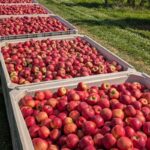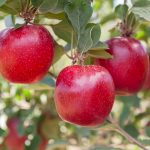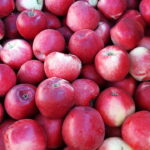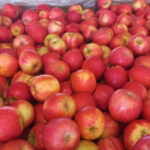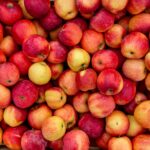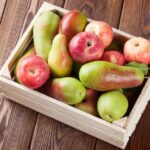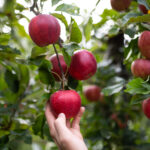Indian promotions kick off for U.S. pears as varietal mix grows

Sumit Saran of SS Associates discusses the U.S. pear deal underway, expectations for Washington apple imports and the results of a multi-faceted Chilean kiwifruit campaign.
Retail promotions have started in earnest for U.S. pear imports in India following early trials of new varieties and an influencer tie-up with a leading celebrity chef to raise interest in the fruit.
Sumit Saran, who represents industry body Pear Bureau Northwest promoting USA Pears in India through his consultancy SS Associates, says this is the first time in four years that the U.S. has seen a full-sized crop.
In June the U.S. Northwest Pear Bureau forecast the harvest would be up to 18.9 million boxes, but that estimate has since been revised upward to 20.2 million boxes .
The represents growth of around a quarter year-on-year and the fourth-largest pear crop in the country's history.
"So it’s a very big crop and we are pushing very hard. So far so good," says the former Future Group executive.
"We have tied up with a big influencer in India, India’s top chef Sanjeev Kapoor, who is looking to get the word out to consumers and followers across the country."
Click here to see Sanjeev's Facebook video, in a mix of Hindi and English with a USA Pears representative.
"We are also doing a lot of media with newspapers, magazines and radio, plus there are retail promotions with all major retailers. We hope for a good result," says Saran.
He said the first trial promotions started with early season varieties Bartlett and Starkrimson in September and October.
"Starkrimson actually came in for the first time, so we did some promotions with that to get it off the ground," he says.
"But our primary focus in the case of USA pears will be green and red Anjous. That's what is just starting so from now until March we will focus on them.
"The quality of the product is excellent, the first arrivals have been very good and retail promotions are just kicking in as we are speaking."
The fruit is also being promoted through India's leading online fruit and vegetable seller, Big Basket, which since earlier this year has been majority owned by Chinese conglomerate Alibaba.
Varietal changes afoot for Washington apples in India
Saran also represents the Washington Apple Commission in India, but given the inter-governmental nature of his work he is reluctant to speak directly about tariffs imposed on U.S. apples, which were to be lifted from 50% to 75% in September but the date has been postponed until Dec. 17.
What he can say though is that Washington apples are not being promoted aggressively at the moment, and this is partly due to domestic competition and a "comparatively small start" with a smaller crop.
"We are waiting for domestic fruit to move out a little bit, and when our season has a clear window - say from February onwards to June-July - that's when we're planning a lot of wholesale,retail, social and digital media promotions," he says.
"The [Indian] harvest is in August-September. Indian apples are in the market at least till February - there have been some reports here and there of inclement weather, but overall it seems like there is a lot of Indian fruit.
"The good quality Indian apples are also very good, so they actually also target the upper consumer section."
He says while the primary cultivar that Washington ships to India is Red Delicious, SS Associates and the Washington Apple Commission have made efforts to increase the varietal mix in what became its second-largest export market after Mexico last year.
"We made a lot of effort for varietal push last year – I would say from a 99% Red Delicious market, it changed to about 88% Red Delicious," he says.
The balance has comprised varieties like Gala, a considerable amount of Fuji and some Cripps Pink. Washington Fujis have been given a particular advantage by the fact Chinese apples - which traditionally have had a strong Fuji presence - are blocked from the market.
"While our focus still remains with Red Delicious which is still a premium product and very important for our industry here, one of the side impacts we try to make is convincing buyers and wholesalers that Washington is the only source where you can get four or five varieties," he says.
"I now know people who will get one container of Red Delicious and one container with a mixed load of varieties. That’s a growing trend and I think that will only get stronger."
While Saran does not personally engage with branded varieties, he sees greater opportunity for them through the fast rise of modern retail.
"We are seeing the first steps and I will not discount it," he says.
Saran highlights how in the past modern retail promotions only provided "good brand building and a photo opportunity" but did not really impact volume.
"But now over the last two or three years, modern retail growth is actually now substantial enough to make differences to volumes, and some retailers are now also getting into direct sourcing," he says.
"One of the things the retailers are realizing is irrespective of how slow or fast they grow, roadside retail is not going anywhere in India; that is just too big and to spread out, even though the growth is fast and the percentage of modern retail has gone from 2-3% to now nearly 8-10%.
"All the retailers are realizing they need to be different from the roadside vendor to be successful. And varietals are a key aspect there."
Chilean kiwifruit imports double after tripartite campaign
The final numbers are yet to come in from a marketing campaign that SS Associates ran for Chilean kiwifruit in India this year, but Saran can safely say imports have more than doubled on last year.
"It was a very unique campaign where ProChile contributed to it from the Chilean Government side, the Chilean exporters contributed to the campaign through the Chilean Kiwifruit Committee, and three leading Indian importers (IG International, NGK Trading and Aayush Impex) also contributed," says Saran.
"It kicked off in June-July and took it for two or three months partnering with wholesale, retailers and online. We have seen tremendous success in year one and we're looking to build on that."
Compared to imports of 5,109 metric tons (MT) in 2016-17, which represented a year-on-year increase of 59%, Saran says figures in 2018 have crossed the 10,000MT mark.
"Chile has a 50% duty advantage over any other origin – India and Chile have a preferential trade agreement where kiwifruit from the rest of the world clears at a basic customs duty of 30% while kiwifruit from Chile pays 15%," he says, clarifying that for other supplying nations the duty is at 30%," Saran says.
"That’s a very major thing. What we did was put that information out to importers, wholesalers and retailers, and then started the consumer campaign and started simultaneously with wholesale and online."
In terms of modern retail the campaign partnered with chains like Reliance Fresh, Star Bazaar in North and West India and Kovai Pashamudir Nilayam (KPN) in South India.
In addition, Chilean kiwifruit were also promoted with cash and carry wholesale operators like Walmart India and Reliance Market, while a major campaign was also conducted with online retailer Big Basket through its 'Fresho' brand.
"Very few people were aware how to eat or get the kiwifruit ripened, so we actually did a lot of education in that space also – sometimes what happens is that retailers want a very hard fruit which is not necessarily the best tasting fruit for the consumer," he says.
"We embedded a video on Big Basket’s website on how to ripen kiwifruit at home.
"We kept it more broad-based, reaching consumers by partnering with retail companies and connecting in concert with PR, social media, digital media. We did a press launch and we also did some major PR and communication outreach with journalists."
And just like SS Associates is doing now with USA Pears, the kiwifruit partnership also partnered with Sanjeev Kapoor.
"The big challenge that we were trying to overcome is that kiwifruit has essentially become like a garnishing fruit. Our effort was to make it a snack, and that’s an area that we need to concentrate and work harder on," he says.
He adds kiwifruit have also been positioned as a remedy against certain kinds of diseases. While it is not a scientifically proven claim and not supported by the medicinal community, there is a widely held belief that kiwifruit can be used as a remedy against Dengue Fever.
"The kiwifruit marketing we would like to do for Chilean kiwifruit is to make it a healthy snack which people can consume any time, and not just necessarily link it to medicine or a pretty fruit for garnishing," he says.
"I am a big believer that it’s really not about a piece of the pie; it’s about the size of the pie. And we want to make sure that we take Chilean kiwifruit as much as possible into tier one, tier two and tier three cities." 
In this first year the fruit was taken to the tier one cities of Delhi, Mumbai, Chennai and Bangalore, while some fruit also made it to tier two cities.
"There is equally large consumption coming out of placed like Hyderabad, Ahmedabad, Calcutta - it’s quite widespread.
"That’s one big difference between India and many other parts of the world – there is no rich city or poor city here. Every city has its own set of rich and poor, so while you may be in a very high-end area of Mumbai or Delhi, poverty will still stare in your face.
"What we see that in smaller towns and cities, there are enough people who have the money but not enough avenues to spend. If we are able to get our products to them and couple it with awareness campaign about the goodness of the product, the potential is huge.
"India is a very heterogenous market, so there is room for all kinds of grades and all kinds of sizes."

















